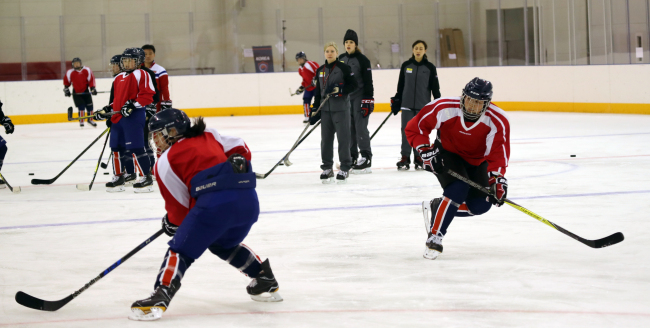SEOUL (AFP) — The unified Korean women’s ice hockey team faced an unexpected challenge at their first joint training session, reports said Monday — vastly different hockey terminology on either side of the divided peninsula.
Seven decades of almost total separation after the 1950-53 Korean War, with all ordinary civilian contact blocked between North and South, has seen their once common language diverge in many respects.
The two Koreas still share the same writing system, known as Hangul — an alphabet developed in the 15th century to replace Chinese characters.
But different words are emerging as they develop separately, and in the capitalist South, ice hockey players adapted the sounds of English words for most sporting terms.
 |
| The unified Korean women’s ice hockey team (Yonhap) |
Skating is called “seu-ke-ee-ting” and a “t-push” — a defensive technique by a goalie — is “tee-pu-sh”.
But the North created its own Korean-language words for each move, calling skating “apuro jee chee gee”, while a “t-push” is a “moonjeegee eedong”, literally meaning “a move by a gatekeeper”.
To overcome communication issues the South’s sports authorities put together a list of the different vocabularies and distributed it to the players ahead of their first skate together on Sunday.
It also includes the English pronunciation of the North Korean terms — apparently for the use of the South Korean team‘s Canadian coach Sarah Murray.
The list was intended “to help players understand”, one official of the Korea Ice Hockey Association (KIHA) told the South’s top-selling Chosun daily.
“But people are still in the process of getting used to it, so we hear a mishmash of terms from both sides during practice.”
Three letter code
The joint team was forged as part of peace efforts by Seoul to use the Pyeongchang Winter Games in the South to ease tension on the flashpoint peninsula.
The atmosphere at the first practice was “serious but amicable”, Seoul‘s
News1 news agency said, citing an KIHA official, adding many Northern players had demonstrated “great focus and fighting spirit”.
Since the division of the peninsula the two Koreas have only competed as unified teams in 1991, when their women won the team gold at the world table tennis championship in Japan, and their under-19 footballers reached the world championship quarter-finals in Portugal.
North and South have their own three-letter Olympic country codes — PRK and KOR respectively, for People’s Republic of Korea and Korean Republic — and the unified team has been accorded its own country code, COR, from the French word for Korea, Coree.
The ice hockey squad is made up of 23 South Korean players and 12 Northerners, who crossed the Demilitarized Zone last week. They are scheduled to hold a warm-up match against Sweden on Sunday.
But the last-minute creation of the team sparked controversy among many South Koreans who accused Seoul of using athletes for political purposes and robbing Southern players of opportunities to compete at the Olympics.
The North will send another 10 athletes to take part in the Games in other sports including cross-country skiing and figure skating after its leader Kim Jong-Un announced a plan to join the event in his New Year speech.
(AFP)



